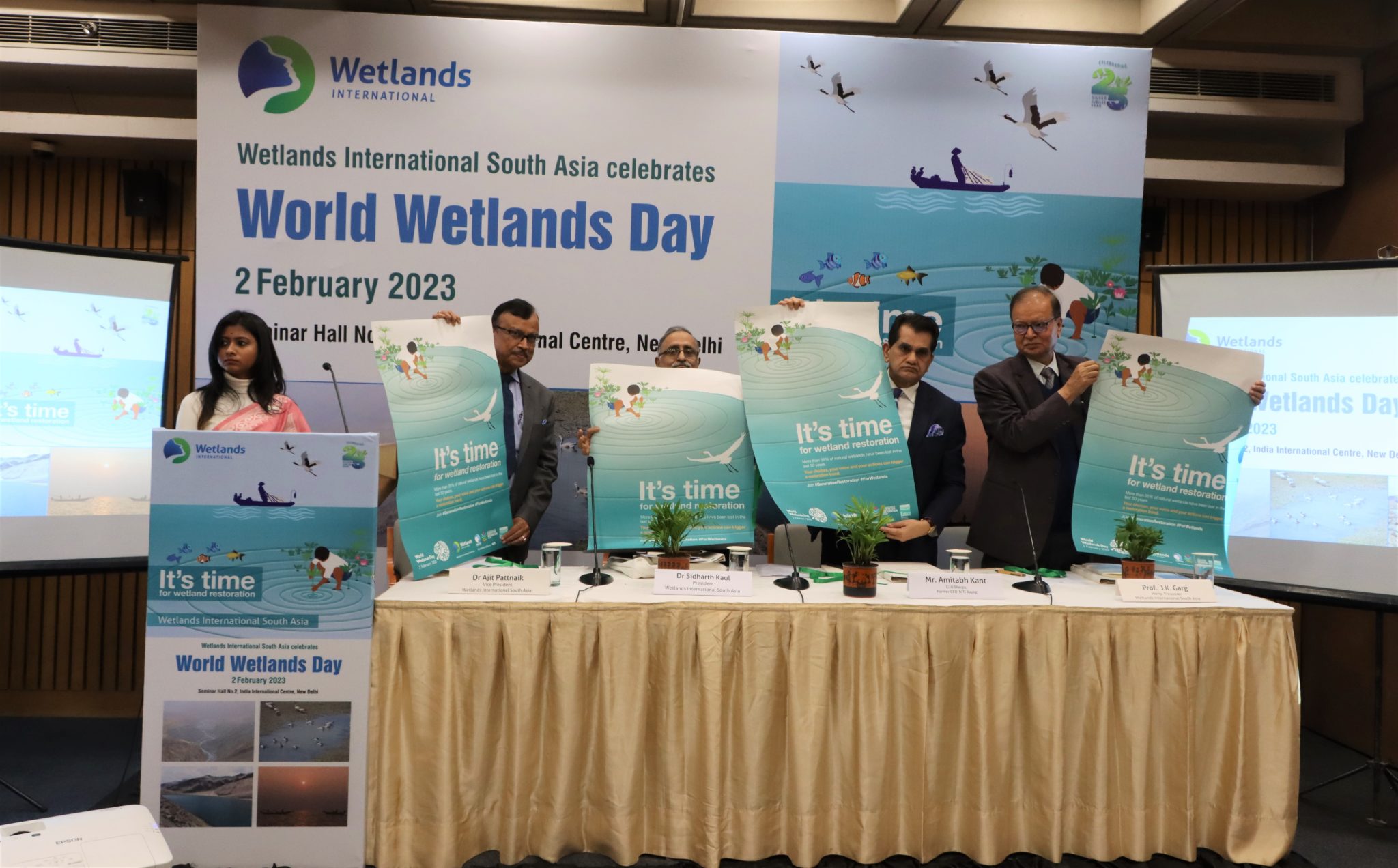
Making wetland restoration a social movement
-
Capacity development
-
Wetland values, status and trends
2nd February of each year is celebrated as World Wetlands Day (WWD) to mark the date of adoption of the Ramsar Convention – an international treaty established in 1971 to provide the framework for international collaboration and national action for the conservation and wise use of wetlands. Each year, WWD is linked to a specific theme to draw the global community’s attention to issues related to wetlands conservation. The 2023 theme – ‘Wetland restoration’ focuses on the significant role of restoring these ecosystems as a way of making society food, water, and climate secure.
To mark WWD, Wetlands International South Asia organised a public event at India International Center, New Delhi to sensitise society to the multiple values of wetlands and the role society can play in ensuring the effective restoration of wetland ecosystems. The chief guest of the event was Mr Amitabh Kant, G20 Sherpa and formerly Chief Executive Officer, NITI Aayog (Agenda at Annex 1). The event was attended by 72 dignitaries from central government agencies, international organizations, academia, civil society, media and experts.
25 years of work for wetlands conservation
Dr Sidharth Kaul (President, Wetlands International South Asia) introduced the theme of the World Wetlands Day 2023 and highlighted the continuous efforts of Wetlands International South Asia over the last 25 years towards wetlands conservation and wise use. He traced the wide-spanning work of Wetlands International South Asia, starting from the initial footprints in Chilika (Odisha) and Loktak Lake (Manipur) to having a South Asia network to champion wetlands conservation and restoration. He pointed out the emerging focus on wetlands conservation, citing the cause of wetlands in Honorable Prime Minister’s address in Man Ki Baat, wherein the Honorable Prime Minister’s emphasised the significance of community participation in creating India’s Ramsar Sites network, which is the largest in amongst Asian countries.
Whole of society approach needed for wetlands restoration
The Chief Guest, Mr. Amitabh Kant delivered the keynote address and called for a whole-of-society approach and affirmative actions to restore wetlands for sustainable development. While according wetlands as the life-support systems, he highlighted the implications of worsening wetlands health on our developmental trajectory. India’s leadership on championing wetlands conservation in the 75th year of India’s importance was opined as a landmark moment to accord wetlands as societal assets and further step-up actions for wetlands conservation and restoration.
This was followed by the release of three knowledge and outreach materials. A poster with the theme “It’s time for Wetland Restoration” highlighting the urgent need to prioritize wetland restoration, and calls upon increase investment of human, financial and political capital for wetlands conservation. A comic book titled “Vanya: The lifeline of Kuhu”, a story of about three kids who travel to Vanya wetland to fulfill their grandfather’s dream of saving the pristine ecosystem from developmental pressure. A unique memento that showcase different types of the wetlands on one side and the other side showcasing the role that wetlands play within the landscape.
Need for striking a balance between ecosystem conservation and human development
A panel discussion on ‘Ecological Restoration of Wetlands’ was organized in the second half. The session was chaired by Prof. Sudhir K. Sopory (Emeritus Senior Scientist, International Centre for Genetic Engineering and Biotechnology). Mr Kunal Satyarthi (Joint Secretary, National Disaster Management Authority, Ministry of Home Affairs, Government of India), Dr Usha Lachungpa (Formerly Principal Research Officer, Forest Environment & Wildlife Management Department, Government of Sikkim), and Mr Ramveer Tanvar (Founder, Say Earth and popularly known as the Pond Man of India) participated in the panel discussion.
Prof. Sopory highlighted the importance of striking a balance between human needs and wetland restoration in the current scenario. He also pointed out the correlation between increasing human needs and environmental degradation. He emphasised on the different causes of wetland degradation ranging from rapid urban sprawl to climate change on a global level.
Mr Satyarthi (Joint Secretary, National Disaster Management Authority) accentuated on the pertinent connection between healthy wetlands and disaster resilience. He pointed out the present rate of wetland degradation jeopardising wetlands interconnections and its ability to behave as natural sponges primarily due to rapid urbanisation being the lead cause behind recent urban disasters such as the Bangalore and Chennai Floods. He underlined the relevance of wetland restoration as a key nature-based solution for disaster risk reduction.
Mr Tanwar correlated urbanisation and loss of small wetlands, citing numerous examples in the Delhi NCR. He explained the loss of 20 lakh historical ponds in India since independence due to the human perception of small wetlands and the tendency to degrade and deteriorate them daily. He concluded that wetlands restoration is possible and can be achieved through behavioral change perceiving wetland restoration as scalable and replicable from successful and established case studies.
Ms Lachungpa presented community-based high-altitude wetland restoration and conservation case studies from Sikkim. She highlighted the unique values of the high-altitude wetlands which are under eminent threats ranging from conflicting stakeholders interests at a landscape level to the menace caused by an increasing population of free ranging feral dogs at a site level. She called for major research institutions to conduct management-oriented research in the landscape engaging local communities.
Prof. Sopory concluded the seminar by underlining the fine balance between wetlands conservation and human needs. He pointed out that if a wetland’s integrity is disturbed it leads to a chain effect degrading the entire ecosystem and associated human well-being and thus bringing different stakeholders and communities under a unified umbrella is a necessity.
In his concluding remarks, Dr Ajit Pattnaik (Vice President, Wetlands International South Asia) appreciated the efforts made by Wetlands International South Asia in promoting the cause of wetlands conservation and urged the organization to take practical and tangible steps to improve the status of wetlands by providing management-oriented knowledgebase, building capacity of stakeholders and working for behavioral change. He emphasized on a multi-sectoral approach and the involvement of locals to deal with wetland management in India.
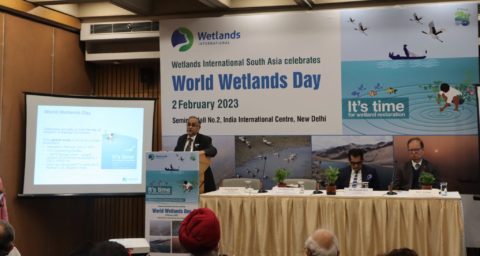
Dr Sidharth Kaul (President), Wetlands International South Asia introducing World Wetlands Day theme
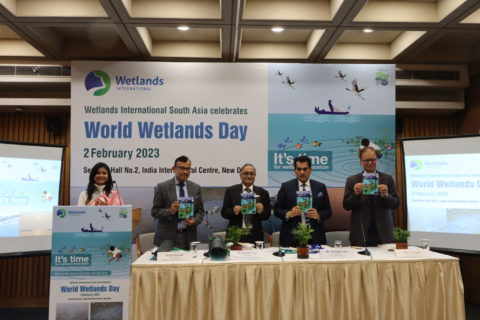
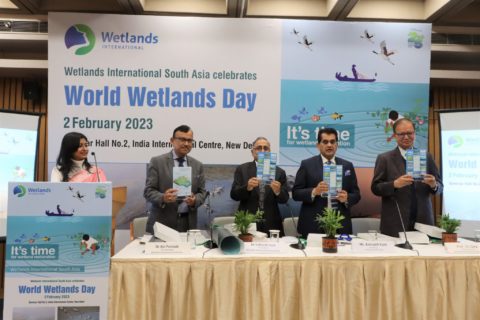
Mr Amitabh Kant (G20 Sherpa) along with Dr Sidharth Kaul (President), Dr Ajit Pattnaik (Vice President) and Prof J K Garg), Treasurer releasing a comic book on wetlands (top) and a special momento on the World Wetlands Day (bottom)
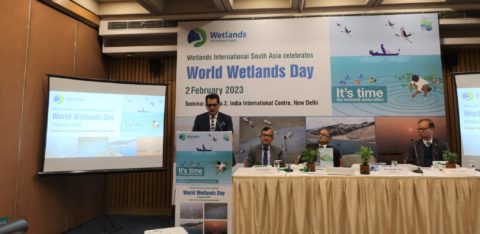
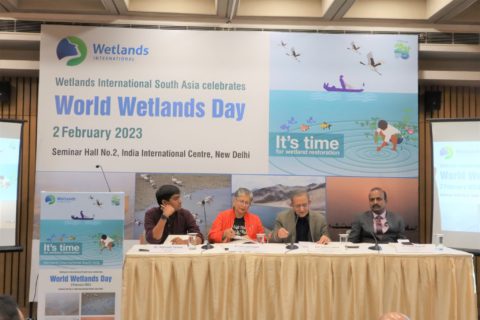
Mr Amitabh Kant (G20 Sherpa) addressing the gathering (top); Panel discussions on Ecological Restoration of Wetlands (From Left to Right – Mr Ramveer Tanwar, Ms Usha Lachungpa, Prof S K Sopory, and Mr Kunal Satyarthi)
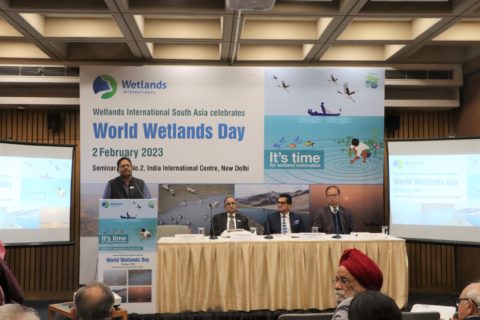
Dr Ritesh Kumar (Director, Wetlands International South Asia) delivering the welcome address
Agenda
10.30 – 11.00 Registration
11.00 – 11.05 Welcome
Dr Ritesh Kumar, Director, Wetlands International South Asia
11.05 – 11.20 World Wetlands Day – an introduction
Dr Sidharth Kaul, President, Wetlands International South Asia
11.20 – 11.25 Release of publications
11.25 – 11.55 Keynote address
Mr Amitabh Kant, G20 Sherpa and Formerly Chief Executive Officer, NITI Aayog
11.55 – 12.00 Vote of thanks
Dr Asghar Nawab, Programme Head (Ecology), Wetlands International South Asia
12.00 – 12.30 High Tea
12.30 – 13.35 Seminar – “Ecological restoration of Wetlands”
Chair: Prof Sudhir K. Sopory, Emeritus Senior Scientist, International Center for Genetic Engineering and Biotechnology
Guests of Honour
Mr Kunal Satyarthi, Joint Secretary, National Disaster Management Authority, Ministry of Home Affairs, Govt of India
Dr Usha Lachungpa, Formerly Principal Research Officer, Forest, Environment and Wildlife Management Department, Government of Sikkim
Mr Ramveer Tanvar, Founder, Say Earth, New Delhi
13.35 – 13.50 Participation from floor
13.50 – 14.00 Session Summary and Way Ahead
Dr Ajit Pattnaik, Vice President, Wetlands International South Asia
14.00 onwards Lunch
